#narnia analysis
Note
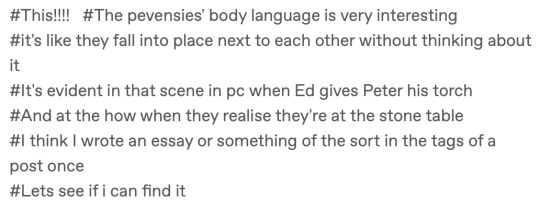
👀👀👀
Tried my best to find that post but no luck, I guess it's just internet debris now :((
Worry not, I'm going to write everything I remember in this post
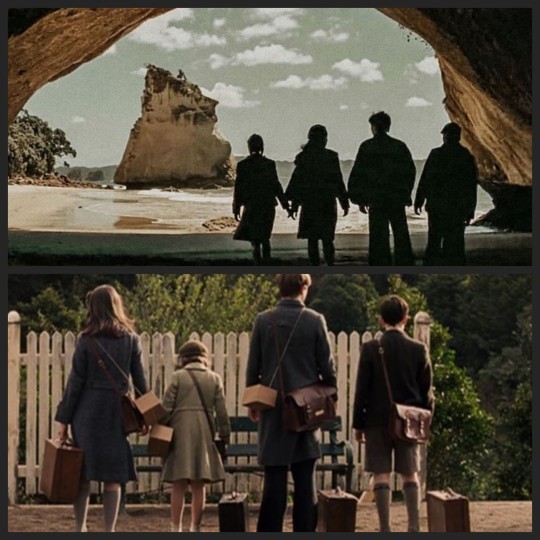
We start with these two. Parallels aside, they didn't have to line up in either of these scenes, they did. This is what they do. They are a group. And no matter how interesting each of their individual personalities are, their meanings are diminished, if not non-existent, without the others' to contrast them.
Coming to the topic of body language, have you noticed how they stand in their lines?
Their positions always have a meaning. In the ruins of Cair Paravel, they stand in the positions of their respective thrones.

Entering Aslan's How, they let Caspian lead the way. Out of the four of them, Peter's in the lead, Lucy and Susan are in the middle although not exactly in sync, and Edmund brings up the rear. When Caspian stops, the Pevensies' gait changes- they are royal again- Peter and Susan start and are followed by Lucy and Edmund.
Contrast this with when they are entering Cair Paravel. Edmund leads, torch in hand. Peter let's the girls follow and is at the end. Doesn't it seem they have an unspoken system for every situation they are in? With a distinction between when they're just siblings and when they're Kings and Queens? Notice how there's no "Susan, you're on my foot!" or "stop shoving!" here.
The last one is interesting because their pairing within the line changes. Uptil now, it's usually Peter-Lucy and Susan-Edmund or Peter-Edmund and Susan-Lucy. This Peter-Susan and Edmund-Lucy pairing is a rarity. The older ones are being barred from Narnia, while the younger ones are told they have more to learn. This changes their usual balance.
Now, let's talk about their 'roles', spoken or unspoken, how they let things be done by the ones who are 'supposed' to do them.
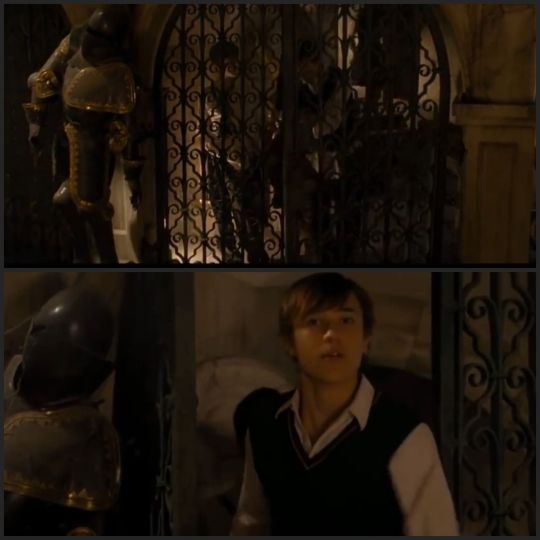
Edmund is the first to enter the ruins of Cair Paravel, and he's the first at this gate, yet he doesn not open it. Susan is second and is followed by Peter. Peter is the one to open the gate and he does it only once Lucy is joined them. High King Peter takes charge here.
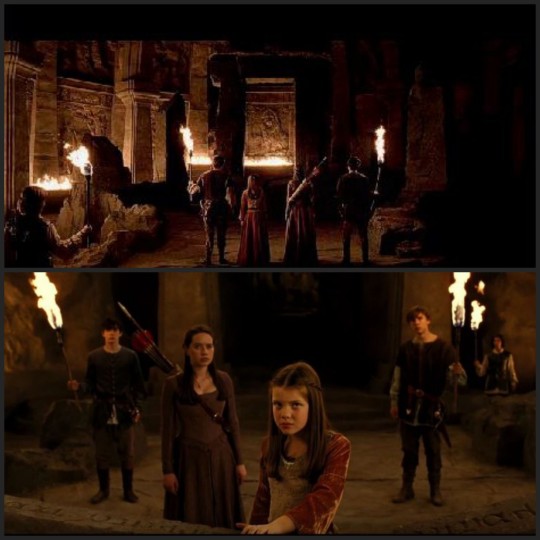
At the stone table, note that Lucy and Susan are in the middle. The boys stand at a respectful distance while the girls approach the table, symbolic of their significance years ago when it cracked. Although Susan was there too and shed just as many tears, Lucy- Aslan's darling daughter- is the one to touch it.
Let's go back to the endings of the adventures. In lww, notice how Lucy and Peter are leaning towards each other, notice how Edmund and Susan are a little to the side, notice there's a wider gap between Susan and Lucy. (I will never shut up about the Pevensies' relationships with each other, especially the difference between Peter-Lucy and Susan-Edmund but one post at a time). When they leave Narnia, they do it together and they do not look back.
In pc, they leave one by one, only when prompted to do so. Notice how this time Susan and Peter are huddled together.

Leaving Narnia in Votdt is interesting. For the first time the Pevensies (even though there are only two of them) are not side by side. I see this as symbolic to their growth. In the end, Peter and Susan- the ones who usually disagreed on everything- found a way to stick together, whereas Edmund and Lucy-who have a hard time believing in their own individuality- finally believe they are not in the shadows and grow into their unique, individual selves.
Finally, we talk about the Pevensies' line when they're missing a person. I've been thinking a lot about this ever since @puddleglumms sent me this ask.
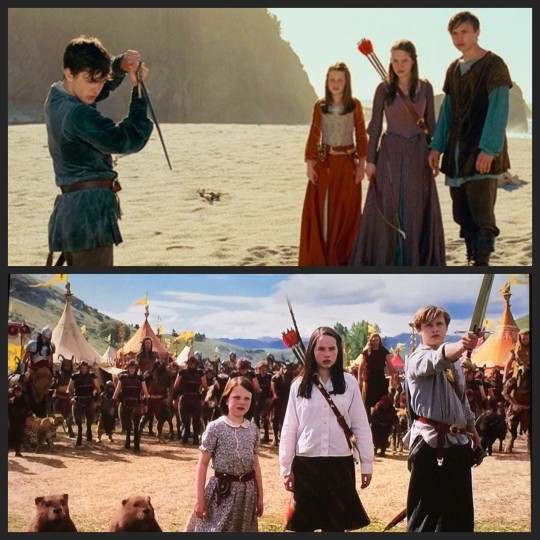
In the first one, Edmund is right in front of them. Even though their line is incomplete, they are still a group. Notice how close Peter, Susan and Lucy are standing. Contrast it with the second picture. Edmund is in danger, he could be dead for all they know, at least two of them blame themselves for losing him. Notice the distance between them now.
This brings us to the last part. Three of them line up with no hint of a fourth. This is a specially tailored nightmare for Lucy where she is no longer a part of the group but it is creepy for us to see this too. It just seems so wrong.
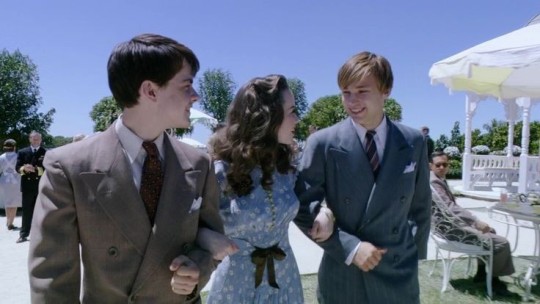
Imagining them lining up once they're dead and realising they're missing one is heartbreaking. Do you think they'd stand as close as they used to? Do you think Edmund will see Lucy and Peter close to each other and miss his companion? Do you think Lucy will be jarred by the absence of the only other female in their group? Do you think Peter will be horrified to know he's the only older one here?
There are so many more instances I can include in this but then the post would be wayyyyy longer. This covers most of what I wanted to say.
#oh boy do i have lots of thoughts about this series#Queen Mal 👑#confessions of a bookworm#narnia#chronicles of narnia#the pevensies#edmund pevensie#peter pevensie#susan pevensie#lucy pevensie#narnia analysis#narnia movies#the lion the witch and the wardrobe#prince caspian movie#narnia meta#asks
406 notes
·
View notes
Text
In my mind, there is a key similarity between Peter and Caspian’s humility, and what that means for them as Kings, though that humility is shown with a very specific difference: Caspian is asked whether he feels sufficient to become king, but Peter is told that he will be.
Here’s Caspian’s exchange with Aslan:
“‘Welcome, Prince,’ said Aslan. ‘Do you feel yourself sufficient to take up the Kingship of Narnia?’
‘I-- I don’t think I do, Sir,’ said Caspian. ‘I’m only a kid.’
‘Good,’ said Aslan. ‘If you had felt yourself sufficient, it would have been proof that you were not.’“
Now, as Caspian says, he is only a kid. The book describes him as being about Peter’s age (14), while the timeline says he is 13, which tells us that he is, at most, Peter’s own age, and at least, the age Peter was at his own coronation. (Though the book description doesn’t disallow for him being 13, I am personally partial to taking it more literally, and thus view Caspian as being 14 in PC. The timeline is a mess, anyway, so I give myself some freedom. This is inconsequential to the greater point, but is just a general explanation of why I treat his age as open here, even though there’s a “canon” answer.)
So, when Aslan crowns Caspian, he first asks him if he feels sufficient, and then applauds Caspian for his humility. The humility in question is that Caspian doesn’t believe he is sufficient: i.e. enough. That’s the big thing Aslan requires of the people he makes stewards of Narnia: not that they themselves are enough, but that they rely on Him; Aslan is the High King above all High Kings, and when he appoints a King over Narnia, he is choosing not just a leader for His people, but someone who will follow.
Now, how does this apply to Peter?
Here’s Peter’s own conversation with Aslan:
“When the girls had gone Aslan laid his paw -- and though it was velveted it was very heavy -- on Peter’s shoulder and said, ‘Come, Son of Adam, and I will show you the far-off sight of the castle where you are to be King.’
And Peter with his sword still drawn in his hand went with the Lion to the eastern edge of the hilltop. [...]
‘That, O Man,’ said Aslan, ‘is Cair Paravel of the four thrones, in one of which you must sit as King. I show it to you because you are the first-born and you will be High King over all the rest.’
And once more Peter said nothing, for at that moment a strange noise woke the silence suddenly.”
Peter is silent through this entire exchange, though, specifically, the second time we’re told it’s because they are interrupted by Susan’s horn. During this conversation, the only insight into Peter’s thoughts is focused on his view of the castle: “[...] but to Peter it looked like a great star resting on the seashore.” We’re given no reaction for what Peter actually thinks of Aslan telling him he is to be High King... however, we are told how he feels in the moments immediately following:
“For a moment Peter did not understand. Then, when he saw all the other creatures race forward and heard Aslan say with a wave of his paw, ‘Back! Let the Prince win his spurs,’ he did understand, and set off running as hard as he could to the pavilion. [...]
[...] Peter did not feel very brave; indeed, he felt he was going to be sick. But that made no difference to what he had to do.”
So, although the narrator doesn’t tell us what Peter thinks about becoming High King, we are told exactly what he thinks and feels about the first act he is called to do under that role: he doesn’t feel ready. Firstly, it doesn’t occur to him that it is his duty to act until Aslan waves everybody else back, though when he understands, he runs without further hesitation. Secondly, Peter has no confidence in his own actions when he goes to fight the wolf; he’s terrified, even though he doesn’t stop running. But that’s the thing about Peter: he may not feel ready, but he will always do his duty.
Compare this to the movie scene, where Peter is given a chance to respond to Aslan’s statement:
Aslan: That is Cair Paravel, the castle of the four thrones, in one of which you will sit, Peter, as High King. You doubt the prophecy?
Peter: No. That’s just it... Aslan, I’m not who you all think I am.
Aslan: [...] Peter, there is a Deep Magic more powerful than any of us that rules over all of Narnia. It defines right from wrong, and governs all our destinies: yours and mine.
Peter: But I couldn’t even protect my own family!
In the movie, Peter is allowed to express those thoughts that remain internalized in the book: he doesn’t feel ready, and that scares him. Yet, when asked if he doubts the prophecy, Peter says “No,” and then when Susan’s horn sounds, Peter runs off immediately, willing to do what needs to be done. Although the scenes switch Peter’s moments of inaction and action, (holding his silence, but failing to act autonomously in the book, but speaking his fears and running in without hesitation in the movie,) both scenes tell us the same thing about Peter’s character: it doesn’t matter that he doesn’t feel like he is enough, because he will do what is needed, regardless.
Back to Caspian for a moment. While he may not have saved the Narnians from the Telmarines himself, at the time that Aslan asks him whether he feels sufficient, he has already been leading them for several days at least -- perhaps weeks -- even in battle. Caspian has acted as King before. And yet, when the question comes, he still feels he is only a kid: there is no way that he alone is enough. (But he is not alone; Aslan rules before him and beside him, so long as Cas will follow him.)
Peter, meanwhile, has never been King. He has led his family, yes, and done what needed to be done, but he hasn’t acted as King in the way Caspian had by the same point in his story: the moment Aslan tells him he will be King. Peter’s a kid. Peter’s scared. Peter doesn’t understand all that this means for him.
And in the book, Peter says nothing.
After all, Aslan didn’t ask him. He told him.
But if Aslan had asked him, I feel Peter’s response would have been very much the same: Aslan asks, “Do you feel yourself sufficient?” and Peter says, “I don’t think I do. I’m only a kid.” But there is one thing I would add to Peter’s response, only because it is the thing he shows us again and again by his actions: “But I will do it because you ask it of me.”
Peter doesn’t take the role of High King without question because he believes himself to be sufficient; if Peter believed his own power was enough, he would never be King of Narnia at all. But the reason Peter doesn’t question in the book is the same reason he starts running the second he hears his sister’s horn in the movie: he will always do his duty. His silent acceptance could never be, “Yes, of course, I understand completely.” It’s him holding in his doubts, his fears, his uncertainties. It’s the way he says, “If you say so, then I will do it, although I cannot understand.”
Peter is duty-bound. Always. It is that quality which, in the movie, took him from “Look after the others,” to, “You will be High King.” And though in the movie they let him question that which scares him, it never takes away from his willingness to do what needs to be done. I don’t think it’s paradoxical for Peter to show us both: he has always been a man of thought as much as a man of action; hesitant but willful; wavering but faithful; humble and noble, in all he does.
When Caspian is asked whether he feels sufficient, it is not exactly the same as being offered a choice; it’s not as if he says, “I don’t feel ready,” and Aslan says, “Then I won’t ask this of you.” The question is Aslan asking: he is simply asking after Caspian’s heart to rule, not his willingness to.
For Peter, this is already decided. There’s no question. But it’s alright, because he doesn’t need the question. For all his fears, he is still willing. For his own uncertainties, his heart is already growing in Kingship.
They’re different boys, in different circumstances. Both are Kings. Both are only kids. And even though one is asked while the other is told, they are both willing, and it is that obedience which makes them the Kings they are.
#narnia#the chronicles of narnia#peter pevensie#prince caspian#king caspian#caspian x#the lion the witch and the wardrobe#narnia analysis#narnia meta#is this mostly Peter analysis? yes#but I think Caspian creates a necessary lens#basically this is my way of crying once again#about how much I adore hesitant!Peter#him not running into his first battle immediately.#him not wanting to choose the way in PC.#it's why I wrote 'a reflection of closed doors'#and why I made him hesitate before shutting the stable door#because he will ALWAYS do what he is asked to#but sometimes it takes him a moment to understand#gah i love him!!#anyway. enjoy.
64 notes
·
View notes
Text

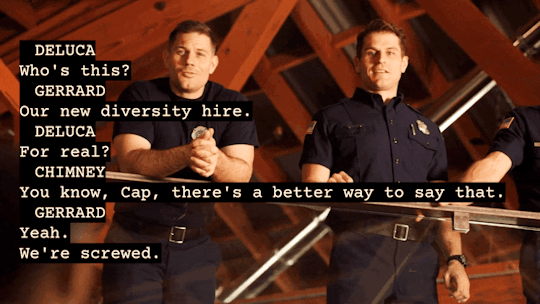

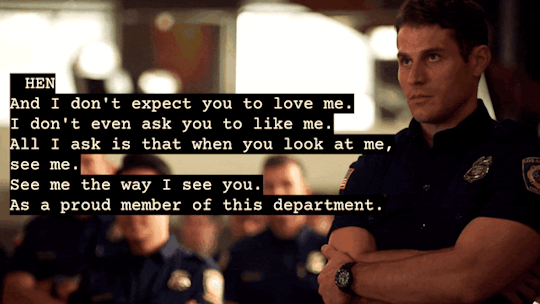




2.12 Chimney Begins - 2.09 Hen Begins - 2.16 Bobby Begins Again - 7.04 Buck, Bothered and Bewildered
Tommy's family arc
#911#911edit#911 abc#911 show#911 spoilers#911 season 7#tommy kinard#evan buckley#evan 'buck' buckley#kinley#bucktommy#kinkley#tevan#pick a ship name you guys and thanks for picking tevan the most correct name#anyway analysis time!#looking back with Modern Knowledge tm about why tommy acts the way he does in the past... babygirl you were so closeted I'm so proud#babygirl was back there getting into narnia#he was so resistant to letting go of the pseudo-family he'd found at the 118 in chimney begins#even tho it was a good old boys club that he knew he really didn't fit into he was making himself fit because at least it was something#but then he let chimney in and then hen came around and he saw a very queer person being openly queer and not giving a fuck what they think#and I think his behavior in that episode was trying to support hen as much as he could without outing himself#because like. how do you give up years of relative safety with people who do care about you they just won't like you anymore if you're *you#then he meets buck in s7 which is like 10-20 years later timeline is fake and he's like oh. this is what unconditional family is#and he's like oh. maybe I can come back. maybe I can be part of this again somehow. maybe we've both grown enough#or at the very least he'll be close to something he never believed would really happen for him#rant over tevan my beloved tim minear pillow cold both sides god bless#my edits
1K notes
·
View notes
Text
Susan Pevensie comes back from Narnia and tries to forget, not because she doesn't believe in Narnia anymore, but because it hurts too much thinking about what she lost.
In Narnia, she was revered, respected. People wrote songs about her, asked for her hand in marriage. She was with her siblings, and she was free, and she could finally stop worrying about her brothers dying in an air raid. She had a people she protected, a land she ruled, and family to look after. She was respected in courts and battefields alike.
Narnia brought other problems, of course. Not all her suitors were kind about her rejection, and Peter and Edmund were expected to lead armies, which meant they were always in the line of fire. More than once had they come home with grave injuries that took months to recover from, even with Lucy's secret potion.
It is this Narnia Susan vividly remembers just aftee she comes back, a wild and savage land where magic roams free, but evil roams free too. It is the Narnia of eternal winter, of giants and ogres, of Aslan dying on the Stone Table. The Narnia of Telmarines, of dead friends, of failed sieges.
England forces her back into obedience, into a mold. Tells her to behave in a way expected of a young lady. Lucy can stay wild a little longer, but Susan has an education to focus on, men to impress. England tells her she is below her brothers again, should get married and have kids.
So Susan tries to forget, convincing herself that the stiff upper lip, tight collars, kneelong skirts, ridicule from adults when she speaks her mind and forced silence is better than the freedom she had in Narnia.
For that freedom had to be paid for in blood. At least in England her family and friends don't risk dying, not after the war.
She alienates from her brothers and sister further. She tells them Narnia was a game, a fantasy. But the difference in faith is also due tk the way she has to hide how it changed her. Peter, Lucy and Edmund do not have to. The boys write long essays about justice and religion, join the fencing team. Lucy dances everywhere she goes and is known to never wear shoes if she can help it.
But the archery club at school will not accept Susan. Neither will the debate team. Her teachers are annoyed with the fact she never slips up, disgruntled at the fact a woman runs rings around them intelectually. Susan is a young woman after a time of war, and all of society would rather she shut up and do what she is told.
Soon, Susan has new friends, new things that matter. All these adult thoughts she can only discuss with her brothers and sister drive her crazy, and there is no one around that takes them seriously. And so she tries to grow up as fast as possible, get to an age where people listen to her again. She forgets so that she doesn't have to deal with the feeling she was meant for much more, to ease the mourning of all that she lost when she kissed Caspian goodbye.
All the Pevensies start forgetting Narnia slowly, the memories fading. Soon none of them remember the names of their generals at Beruna. They forget the smell of battle, the weight of an iron sword in their hands. But they all still walk as if their crowns are on their heads, and ride horses in a way none of their instructors understand. It takes a while before they are back to their Narnian levels, but it is clear to them someone has instructed them before. None of them can figure out what commands they use, however. Is it western style, perhaps? Or maybe rodeo? They cannot have been taught in England, not with the amount of control they can exert with and without saddles, the sense of balance. Some of their teachers are astonished by their academic growth, but others attribute it to the lax education standards after the war. Susan is sold short most often, but all the Pevensie children suffer from arguments with teachers and attitude problems. Teachers generally don't like it if you behave like you are older or more important than them. It's worse because they are almost never wrong, even though all of them feel the effects that having a teenage brain has on their speed of thought and the coherence of their arguments.
The Pevensies deal with these remnants of Narnia in different ways. Susan becomes an actress. She picks West End over Oxford because the stage is a place she is allowed to be free. And since Narnia, dry textbooks don't thrill her like they used to, while the fantasy concepts of spirits and courts and magic and other things thespians work with entince her all the more. Inside her is a longing to become someone else. She knows where it comes from, but she doesn't want to acknowledge it.
Susan plays a queen often, or a diplomat, or a model. Something about her performances have audiences hooked, convinced she was royalty in a different life.
Remembering Narnia hurts. She scolds someone for being reckless with the stage props while teaching them the correct way for a full minute before realizing the person in question is older than her, and doesn't listen to a young woman. He has the same name as her younger brother.
So Susan forgets. But as she carves her way into the elite of old Hollywood, years later, she begins to remember as well. What it's like to have a voice. How it feels like to have people listen.
When Lucy, Edmund and Peter die in the train accident, Susan weeps for days. She knows what she has lost in them. She is now the only person fluent in their interpersonal language, the only one that still remembers the mating call of the centaurs, what jokes a forest spirit makes. She is now truly alone in the world.
Narnia comes rushing back to her during this grieving period. Eventually, she remembers that she used to have a voice, a crown, lovers of whatever gender she wanted. And also how Narnia would have you pay for freedom in blood. They gave up on that freedom to protect her siblings. only to lose them anyways. Suddenly, Susan remembers how Narnia was fair, how a bargain struck was a bargain kept. She remembers the nymphs, the trees in spring. She remembers the beauty of it all.
Later, when Susan is a grown woman and an arrived actor in Hollywood, Aslan begins returning to her dreams. He never speaks to her, but the sight of him gives her strenght. She was once Susan the Gentle, who accompanied Aslan to his death. It is time she returns to being that person.
After the Stonewall riots and during the AIDS epidemic, Susan is the only actress willing to make a public stand. It costs her 2 box office hits and a 3 month ban from the tabloids. But she remembers justice, and the price of freedom. Others start looking to her for wisdom, just like they did all those years ago. Susan feels her quiet strenght returning, her faith slowly coming back.
She stops wishing she could forget Narnia. The magic that was responsible for the memory faded with time. Maybe it was just to protect her from mourning a world where she was so much more.
When Susan looks at the boys coming back from wars in Korea and Vietnam, she recognizes the look in their eyes. Reflected in their behaviour is a maturity that shouldn't be present in teenagers. The loss of innocence, the unrepairable damage to their childhood illusions. It is a look she spent her twenties avoiding mirrors for, because she knew what it meant. No matter what she told herself then, she believed in Narnia. She still does now.
She knows her siblings are in a different place now, and that she revoked her faith in that place, but slowly, as the years grey her hair and wrinkle her face, she begins to believe she may one day join them there. She remembers Aslan as a kind lion, even if he wasn't a tame one.
She grew old in Narnia once, after all. She hopes to die there.
Once a queen of Narnia, always a queen of Narnia
#my most famous post on here is about the Pevensies coming back to England#here are some more thoughts about it.#narnia meta#the lion the witch and the wardrobe#narnia#peter pevensie#lucy pevensie#susan pevensie#susan pevensie meta#idk this concept of forgetting the other world seems fucked up#prince caspian#character analysis#fanfic#edmund pevensie#susan pevensie fanfic#the problem of susan
2K notes
·
View notes
Text
okay random 4am rant time, don't take it too seriously, but: people need to recognize there's a difference between "bad worldbuilding" and "worldbuilding styles you personally don't like."
bad worldbuilding is, for example: internally inconsistent, bigoted, or something else that messes up the plot or characterization of the story itself. sloppy. careless.
things that are *not* bad worldbuilding:
minimalism.
i've been thinking about this in the first place because i saw a post about the Murderbot Diaries a while back (don't know who made it, don't care; this ain't personal) saying the worldbuilding in those books is bad and lazy. to me, as an avid sci-fi reader and writer, that is clearly not true. but i understood why they thought this. the series uses extremely minimalist worldbuilding which intentionally withholds a lot of detail, in a way that is consistent with the (nonhuman, robot, depressed robot) first-person POV. this could also be a feature of the author's writing style in general—i haven't read her other works—but i wouldn't bet too much on it.
the signature of intentional minimalism is that there *are* details about the speculative setting—they're just doled out very thoughtfully and sparingly. the intent is to leave you a little hungry for more. it's to make you think very carefully about the details you do have. this is best suited to stories that already have elements of psychological and/or mystery plot types. the worldbuilding you do see should still be believable, internally consistent, and have interesting implications if you think about it a bit. but you are for sure going to have to think harder to get it.
if you're not in the mood, i will concede, a minimalist style definitely comes off as a bit dry. if you are in the mood, it's relaxing.
whimsy.
this is a big one for sci-fi fans in particular. see: the constant debate about whether any particular story is "hard" or "soft" sci-fi, and whether soft sci-fi is bad, etc etc. but worldbuilding doesn't have to be realistic to be good. you're allowed to have Jedi and humanoid aliens and time travel in your sci-fi. you're allowed to have historical anachronisms and astrology and po-ta-toes in your fantasy. whether or not they're silly isn't the deciding factor on how "good" these worldbuilding elements really are.
the key thing is tonal consistency. you've got a serious high-fantasy setting with its own strict, un-Earth-like theology and magic system, and you throw Santa Claus in there? yeah, that's not gonna land well. but C.S. Lewis can get away with that in Narnia just fine. why? because the Chronicles of Narnia are whimsical children's stories with a strong Christian/Western mythological influence already, and their central conceit is a crossover between the mundane world and the magical world. of course Santa can cross over too. it's whimsical, but it's not actually random. (and if you ventured into straight-up comedy, you could get away with random too. as long as it's funny.)
the unreliable narrator.
i don't have a good example for this off the top of my head (maybe Murderbot again? idk, i'm sleepy, fill in your own) but i'll tell you how to recognize when this is done well.
by definition, an unreliable narrator has some key misconceptions about their own world. so how do you tell what's going on as a reader? how do you know the writer isn't equally confused?
you connect the dots. solve the puzzle. in practice this is similar to reading a minimalist setting—but instead of just sparse clues, you also have a boatload of red herrings. you can catch some of these misleading details by comparing them to your real-world knowledge and saying "wait, this doesn't add up." other times, the false clues intentionally trick you by subverting those real world expectations.
the trick is in the consequences. regardless of what the narrator says, their actions should still have logical consequences. there should be things going on that the POV character doesn't know about. the character will be forced to learn and adapt their narrative because of these shifting circumstances. you can catch them in a lie. the inconsistencies themselves tell a story.
...
i'm gonna stop myself there because this post is long and i oughtta be sleeping. just. this is a distinction worth making. is it really bad worldbuilding, or is it simply not the genre you're craving today? learn the difference for your own sake. you'll have an easier time realizing if a story is something you'll find enjoyable to read, regardless of its actual quality.
#long post#writing#worldbuilding#media literacy#media analysis#the murderbot diaries#the chronicles of narnia#Christianity mention#rant#sleep deprived
235 notes
·
View notes
Text
disclaimer: i have only watched the narnia movies, i have not read any of the books. if there is information from the books that relates to any of this i would love to hear it. this post was inspired by @fallingskiesandrisingseas and their character posts of the pevensies
its so horrible thinking about how the pevensies came back to england after basically living another life.
they basically lived a lifetime. they had friends, possibly enemies, lovers maybe, they had people they cared for and who cared for them, they grew up.
and to have all that taken away when they come home, years and years of building a life in narnia gone
sure they have their memories, but not their bodies, friends, kingdom. theres no way they could���ve acclimated back in england after being in narnia for decades. all the costoms they learned, the languages, the repect and adoration they created. gone
i know narnia and beyond is some religious allegory for heaven/an afterlife, but to people who aren’t religious/grew up being taught it, it was devastating to watch. theres no way they would’ve come back home of their own free will.
i mean they grew up, they matured. they knew war and death, love and respect. i mean Lucy became a woman a leader a queen, she had to be taken back to a body that is way to young to know most of that stuff.
i mean how would they even know how to act anymore, act not like nobles, like the commoners they are in england. its been YEARS, theres no way they remember every detail from their past lives. they wouldn’t even need school really, maybe some stuff but would they even want to pay attention. theyre fully mature adults trapped in a childs body.
and how would their kingdom fair when they left without any warning. we see later that it fell to history, but before that happened. their leaders are gone, their protectors, their friends, family, just gone forever. im sure there were people that were trusted to take over, but thats still a big change when losing the kings and queens of narnia
i truly believe they shouldve been able to live in narnia forever. the other movies should’ve been different characters or something else. i love these movies, i just wish they hadn’t ended like that
#narnia#chronicles of narnia#lucy pevensie#susan pevensie#peter pevensie#edmund pevensie#aslan#aslan did them dirty#movie analysis#movie review#and why the fuck would they want to go back to war ridden old ass england
136 notes
·
View notes
Text
King Edmund the Just - an Easter reflection
“If we confess our sins, He is faithful and just to forgive us our sins and to cleanse us from all unrighteousness.” —1 John 1:9
It’s always bugged me that Edmund, the one for whom Aslan died, was declared “the Just.”
“Just” is defined as “based on or behaving according to what is morally right and fair.” But why, after all that Aslan had done for him, was Edmund not “the Merciful”? Didn’t Aslan’s mercy toward him cause Edmund to be merciful too?
Aslan wasn’t being “just” when he died for Edmund. He wasn’t being “morally right and fair.” If he was, he’d have let Edmund die for his treachery. That’s the moral and fair response to Edmund’s sins.
In the same way, God would be “morally right and fair” to let US die for our sins.
So why is God not described as “merciful and gracious” in this verse? Why is God described as “just,” if justice should mean we are punished for our sins?
I believe, personally, that it’s because of God’s promises. God is faithful and just—God does what is morally fair—when He does what He’s promised to us.
When Jesus took our place on the cross, He took all of God’s wrath. For God to punish us further—for God to not forgive us—after Jesus TOOK our punishment would not be “faithful and just.” This is what “faithful and just” refers to.
This is why Edmund is referred to as “the Just.” I believe that during his reign in Narnia and throughout his life in our world, Edmund is not just in the sense that he exacts punishment on those who are immoral—he is just because he gives mercy. Edmund sees the sacrifice Aslan made for him—and all of Narnia in the process—and he sees the punishment taken.
Let us live by Edmund’s example—and God’s—and be just, extending mercy because the ultimate punishment was taken by Jesus.
Praise God that He is faithful and just regarding the promises He’s made to us. Praise God that He is faithful and just to forgive us when we confess.
Happy Easter, Narnians! He Is Risen!
—Mod Ailora
#thenameofaslan#narnia#the chronicles of narnia#c. s. lewis#edmund#edmund pevensie#king edmund the just#analysis#justice#mercy#forgiveness#mod ailora
56 notes
·
View notes
Text
Ok, rant because I just re-watched The Lion, The Witch and the Wardrobe for the first time in years, and with the knowledge of storywriting I've accumulated in the meantime, the movie really impresses me.
One thing that struck me was that I could see that the people who made the movie had read the other books in the Chronicles of Narnia series. The most obvious is professor Kirke's reaction (beautifully played by Jim Broadbent) to learning of the world inside the wardrobe. He doesn't react with curiosity, but with recognition. Because he knows where the wood for that wardrobe came from. Because he has been to that world. Because he witnessed the creation of that world.
There are other minor examples, like the fact that the Lamp Post only has one cross arm (the other was torn off by queen Jadis in The Magician's Nephew).
This is something that has hugely bothered me about several more recent adaptations of books that I love, such as Eragon or The Letter for the King, which were clearly made by people with little to no knowledge of other books in the series, and perhaps no expectation to further adapt the series. These two are the most egregious examples I can think of right now, as they are both adapted so poorly that their respective sequels are pretty much impossible to adapt as a result of plot points they have changed, characters they have left out, or characters they included but killed off even though they are extremely important to the sequels.
Rant over.
#writing#movie adaptation#movie analysis#the lion the witch and the wardrobe#the chronicles of narnia#narnia#the magician's nephew#eragon#the inheritance cycle#the letter for the king
157 notes
·
View notes
Text
Y'know I find it incredibly ironic that in my Chronicles of Narnia fic series, an interesting inversion in fate (and character development) finds the most rebellious among the most devoted to restoring Aslan’s kingdom, while the most faithful fell the furthest. Edmund turns back at the tree and becomes a king of Narnia alongside Caspian, helping guide it into a new golden age and earning the title of the Once and Future King, while Lucy literally becomes an eldritch goddess and is implied to have straight up killed Aslan at some point. Edmund gets his redemption arc and then some, becoming one of the greatest kings in Narnian history, securing the legacy of Aslan, while Lucy, the most faithful, falls further than even Lucifer and ends up usurping God himself, not because she desires power, but because she sees the way that Aslan uses it as unjust.
And yet...both of them are doing this for the same reason. To be a champion of the downtrodden. To correct injustice. To secure themselves and their own kingdoms so that it can never be stolen from them again.
Gotta love some foils/parallels!
#chronicles of narnia#edmund pevensie#lucy pevensie#hey anyone read “long and happy was their reign?”#or “even a traitor may mend?”#casmund#prince caspian#no i did not stutter#i said that lucy pevensie became an eldritch goddess#what's there not to get?#aslan#my fics#aletterinthenameofsanity#fanfic#ao3#meta#listen it has been four-five years since I wrote these fics#some meta/re-analysis is well-deserved
41 notes
·
View notes
Text
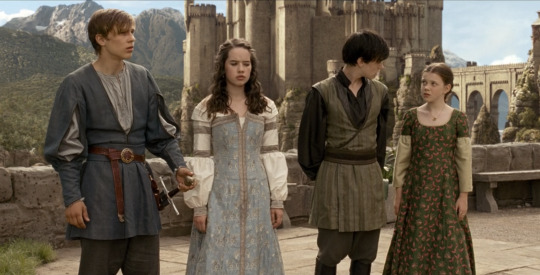
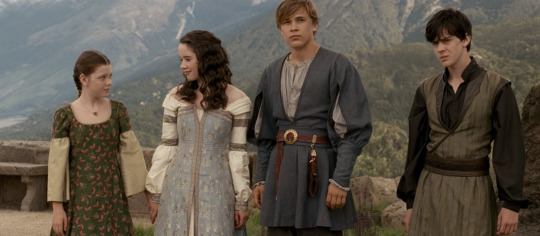
just... their final Narnian outfits all matching in some way???
Peter and Susan both having blue, Edmund and Lucy wearing green, Susan and Lucy both having floral motifs, and Peter and Edmund both having the tunic-style and wider sleeves??
but the colors of their outfits are really what i want to focus on!!
Peter and Susan both wearing blue is SO important to this moment in their story:
blue is, ofc, the color of sadness, and it's heartbreaking that they have to leave Narnia, leave their country, their home, and know that they won't be returning
it's also the color of responsibility and calmness, and Susan's title is LITERALLY the Gentle Queen, and she's always been the voice of reason within the four siblings.
Peter's dark blue that he's wearing specifically represents strength and reliability, which is... like the perfect color motif for him to wear in this final moment as the High King of Narnia (ik, "once a king or queen, always a king or queen" but still)
and i don't talk about the religious aspect of Narnia much, but the only thing that i will say is that in the bible, blue represents Heaven, and while Peter and Susan aren't going to Aslan's Country, they're leaving their Narnia and never returning, so it's sort of like that.
now, Edmund and Lucy being in green:
Green represents growth and prosperity, and in this moment, Narnia is entering a new age, and while Lucy and Edmund are growing, they know that they'll still be able to return to Narnia one day
i think it's also important to note that green obviously represents envy or jealousy as well, which is why I think it's a smart choice for Edmund to have green. While he's obviously no longer envious of Peter or his siblings (because, for the first time, Edmund's getting something that Peter won't have again), his jealousy was such a big part of his character in the first movie (and into the third movie) that it just fits for him to be wearing green.
Lucy's light green sleeves represent youthfulness and relaxation, which is perfect paired with the darker green, because she's maturing and stepping into a new role now that her older siblings are leaving.
and also, the color matching creating an obvious split between the four, with the two who are leaving have the color representing sadness, whereas the two who will be able to return have the color representing rebirth and growth??????
so yeah, i'm obsessed with these final Narnian costumes and what they represent for the siblings, and i WILL overanalyze every single costume in this movie and no one can stop me <3
#chronicles of narnia#prince caspian#susan pevensie#peter pevensie#edmund pevensie#lucy pevensie#character analysis#costume analysis#hearth overanalyzes
428 notes
·
View notes
Text
Started up the reread of The Last Battle, and was immediately baffled by the structure. I'm just sitting there like, "Did Lewis completely forget how to tell a story children will enjoy?" The other Narnia books all start with a child's point of view. Mostly of children from our world--familiar, understandable, likable. The one exception is The Horse and His Boy being from the point of view of a Narnian character, but even he's a recognizable fairy tale archetype--the mistreated orphan with mysterious origins who's about to be dragged into adventure. The Last Battle starts with a talking ape being horrible to a talking donkey, neither of whom is very likable. They read more like an adult's satire of other adults than as compelling characters for the start of a children's story. And starting with the villains is a very odd structural choice. It'd be like starting Prince Caspian from Miraz's point of view, or The Magician's Nephew from Jadis' point of view.
Even after a heroic character comes on the page, he's not a child. He's a twenty-five-year-old man. A king we don't know much about save that he was once in the wars, became buddies with a unicorn, and likes going to his hunting lodge to get away from the palace. Which is a decent-enough character sketch to be starting with, but after one moment of action, the story settles into long-winded philosophical and religious debates where the hero himself is pretty close to being taken in by all but the most outrageous claims of the villains.
Then this all leads to the moment where the Narnian character thinks back on the child heroes from the other books as great legendary figures--heroes miraculously brought from another world--and cries out for their help. Which is a fantastic moment. Now, our world is the wondrous fantasy land, and these ordinary professors and children are legends a king stands in awe of. And when the king appears to them, they react in awe, and it's like we're getting the ghost story from the point of view of the ghost. It's a great moment from two different directions, and it makes me understand what Lewis was going for when he structured the book like this.
But I'm still not sure it was worth it. There could have been other ways to convey the same information and facilitate the same reveals without starting that way. It could have started with a sketch of Tirian, where we learn that Aslan hasn't been seen in a long time, and understanding of him is dying out a bit. We could see Tirian's excitement over the idea that Aslan has returned, his confusion that Aslan isn't acting like Aslan--and then get the villain point of view where the narrator tells us what's actually going on, much like Lewis did in books like The Lion, The Witch, and the Wardrobe. And even if it would have wrecked the amazing moment of seeing our world from Tirian's point of view, it could have been fun to start with the Professor gathering up all the seven Friends of Narnia, and having a nice nostalgic wrapping-up-the-series dinner party scene before they're all dragged into another adventure.
I'm not one to say that books for children have to have only child protagonists or be structured in certain ways. Kids are smart and can handle lots of different types of books. But even as an adult, this storytelling structure is a struggle. I'm sure Lewis had his own artistic vision and this structure is probably accomplishing things that I'm not seeing. But I can't help wishing it'd been structured differently.
#the chronicles of narnia#the last battle#c.s. lewis#this is all good-natured analysis#i probably wouldn't even post criticism#but i'm tired of the only discussion of 'the last battle' being the problem of susan#there's more to discuss here!
42 notes
·
View notes
Text
Susan and Her Mom: A Scene Analysis
We often talk about Susan as a mother figure, young as she is, due to her gentle, practical, nurturing nature. Don’t get me wrong: she is absolutely a child, too; she is rash and fearful and wondering and playful, and I don’t mean at all that we should ignore those qualities. But there is also a lot of pressure on her as the eldest daughter to help and look after her siblings, (especially as they are sent away from their actual mother,) and there is something of a mother in the way she does this. (One of my favourite examples of this in the books is in Prince Caspian when Edmund and Lucy want to leave their shoes on the beach to explore barefoot, and Susan insists that “this would be a mad thing to do.” She is concerned that they may lose their shoes, and is thinking about the fact that they might need them later, and this reflects a specific quality of responsible practicality which reminds me of a mother who knows where her entire family’s belongings are at all times. Susan is aware, because she feels it is her job to be.)
But, for this post, I want to analyze a scene in the first movie which gets me every time, and that is the scene of the Pevensies saying goodbye to their mother in the train station. To begin, we will look at the way Mrs. Pevensie hugs Peter:
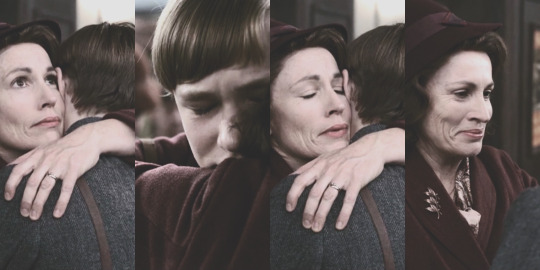
Firstly, when she approaches him, she does so with a brave face. She’s a little disappointed/hurt, of course, having just been rejected by Edmund, but as she hugs Peter, she makes it a point not to look as upset as she feels. Her eyes are wide open, and her face is soft.
Once Peter can no longer see her face, however, her composure crumbles. She squeezes her eyes shut tight, fighting off tears of her own.
Lastly, as she pulls away again, the moment he looks at her, she smiles. It’s back to brave faces: don’t let the children know you’re upset.
Now, look at the way Susan hugs her mother:
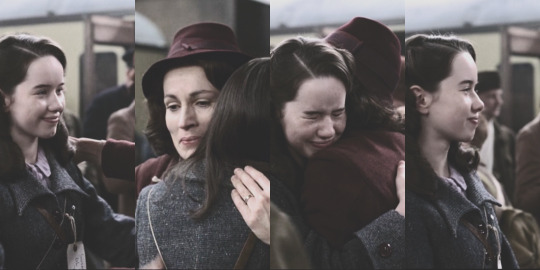
Greets her with a smile.
Cries when she can’t see.
Smiles again. Don’t let her know you’re upset.
She hugs her mom the same way her mom hugged Peter.
In the books, Susan has a very specific type of bravery; it comes and goes, but it is far from nonexistent. There are plenty of moments and ways that she takes a stand others might not expect her to take. And I think this moment in the film showcases one type of bravery that Susan reflects: the courage of her mother.
Susan is emotional. We see her cry plenty of times, and she does not hide her emotions very well. Especially in the books, we see that softness (or sometimes harshness, in the case of Prince Caspian) very well. While I am analyzing this movie scene, and as much as I love what it represents, I am not saying that an accurate portrayal of Susan would hold in her emotions all the time; this is something Susan struggles with.
However, there is something about her mimicking her mother here. There is something about her holding in her tears because she thinks she has to. There is something about her feeling like she must be strong, and that this is how she chooses to be strong.
There is good and bad in choosing to be what people need you to be: both righteous self-sacrifice, and the risk of a burnt-out, hardened heart. And, honestly, that’s a bigger point than I came here to make! When I think of Susan later -- in the time leading up to The Last Battle -- I can’t help thinking she took it too far; she became what the culture and society around her wanted her to be, because it was so much easier than holding on to her grief. That wasn’t a courageous decision; it was a scared one. But when I think of Susan here...?
When I think of Susan telling herself, “They need me to be strong,” and holding back her tears because she wants to look like she has that strength, I just can’t help but think... that’s courage. Even if she never should have had to have that courage. Even if she needed to be a kid, not another little mother for her family. Even if we wouldn’t call it fair. Even if it’s not healthy for her at all.
That was Susan choosing to show courage.
And it touches my heart that that was the way she chose to show it: by reflecting her mom.
#narnia#the chronicles of narnia#narnia analysis#susan pevensie#mrs. pevensie#the lion the witch and the wardrobe
11 notes
·
View notes
Text
You know the expression "Wolf in sheep's clothing"?
Well....
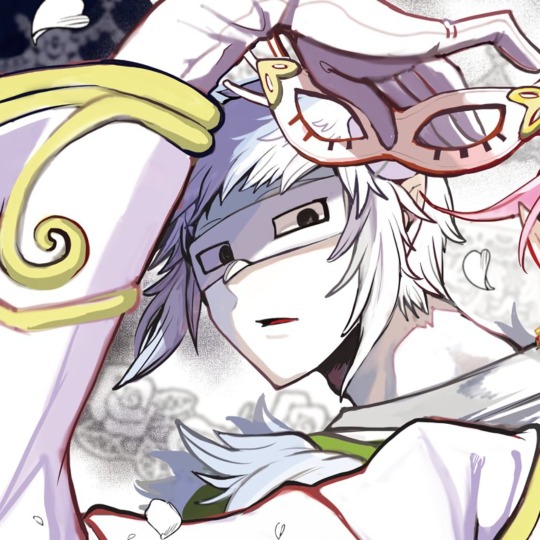
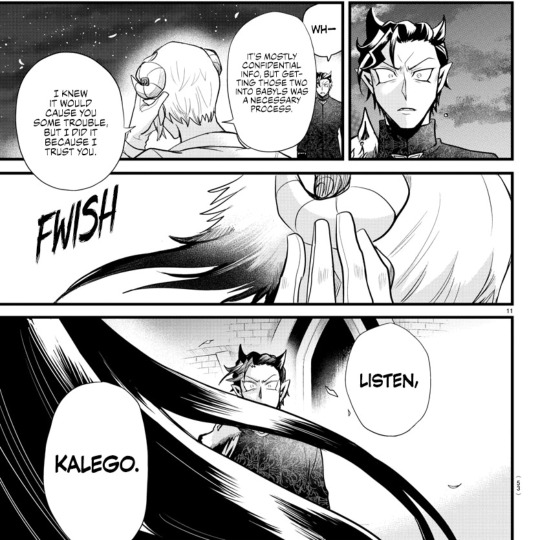


The ram horns, the white color palette, the fluffy fur in his coat, the completely different personalities. And he revealing himself, revealing himself as the wolf, in the light of the full moons.
These "two" are opposed in many ways: black and white. Short hair and long hair, unnoticed and talkative. They are the Friendly Sheep and the Hateful Wolf.
If Fenrir isn't real, then Narnia nail it with this alter ego. Credit goes to Nishi ofc. The whole concept was great, it really fooled us all. I don't think anyone saw that coming (it's obviously backed by Henri's part as well)
And on the subject of "If Fenrir isn't real." Well I'm completely frustrated, I want him to be real. It's just too sad that that charming goofy guy was actually the extremist hater Narnia.
I must say that Fenrir is super well built. It has a definite behavior that includes mannerisms. They give him a good position in the Border Patrol. Henri supposedly says nice things about him to Amelie, which gives him more credibility
He really felt real.
He didn't give a family name tho. That added to a fake persona, but it also avoids questions about the bloodline.
I don't know how convenient it was to make him Amelie's SD, he would have to be bound to his lady. Or Henri was desperate for someone to watch his daughter while she was with Iruma 😂 well the story needed for those two (Narnia and Iruma) to meet up.
After the truth about Narnia/Fenrir and Henri was revealed I was wondering why there was not a Fake Henri. Because he's a crown and he was expected to be with the others (Didn't that raise confusion in Amelie?). It occurred to me that a real Fenrir could be making the part of a fake Henri. But at this point I doubt it's needed, with the party over I mean.

Look at his hand. Doesn't that look like a dog? Sneaky little puppy.
#mairuma#mairimashita! iruma kun#m!ik#iruma kun#welcome to demon school iruma kun#mairuma character analysis#narnia naberius#Fenrir#this was so clever#what great cover up#and btw those are the Irumeri moons stay away from there you nazi demon
123 notes
·
View notes
Text
The Pevensie kids are otherwordly in more ways than the naked eye reveals.
For starters, with all the years they have spent around great cats, they are absolutely silent when they walk. They can stalk and prowl like no one's business, and once, when a girl pissed off Lucy, she showed her her teeth.
When a shrink asks her why she is scared of cats, so many years later , she remembers the white flash in the schoolyard, the sudden certainty of death.
Second of all, they don't seem to leave footprints in snow. In the winters of Narnia, magic was all around Cair Paravel, benign spirits showing them how to leave no traces, go unseen in the great white. Some swear they move without touching the earth. No one is sure enough to rebutt them.
The Pevensies are unbeatable in snowball fights. Especially Susan can throw like a honkball pitcher, able to single out and pick off targets that should be out of reach.
When the boys drink alcohol for the first time, at ages 17 and 15, they turn out to have great tolerance, something no one their age should have. Yet Peter and Edmund can beat anyone in a drinking game. Narnian spirits were strong (pun intented), so they do not find this feat particularly challenging. And no one understands how Susan puts away bottles and bottles of wine without ever slurring her words or losing her razor sharp mind.
The boys that keep pouring her more wine, hoping to take her home drunk, leave disappointed every night. Susan knows what's up. She's been forced to sit through boring diplomatic dinners with alcohol as her only interesting companion, is used to men trying to take advantage when she drinks. She will not be tricked by school boys.
They have a tolerance for other substances, too.
When someone gets the bright idea to roofie Lucy at age 16, he ends up with a nail through his foot, hanging from the highest tree in London.
Lucy shows up the next day with dirt under her nails and a hammer in her backpack. The teachers take one look at Peter, who stares back with a glare that could refreeze Narnia, and decide not to say a word.
They're all insanely strong swimmers. Susan won prizes before, but now she's breaking records. Edmund saves a man twice his weight from drowing, dragging him along across a cold lake for half a mile.
No one understands how the scrawny, 5"9 kid pulled that off. Or how he manages to hold his breath for so long.
And then there is the question of their minds.
Suddenly, Edmund can beat even the most experienced men in chess. He goes on to become champion of the region and then of the whole of England.
Peter, once a mediocre student, is now a stunningly good writer. When his professor reads his essay for Ethics, he weeps, something that has never happened before. Many see a future in academia for him.
Susan becomes known as the best problem solver in school. She's able to resolve many conflicts, not in the least because she's so attractive men stop thinking about fighting the second she steps into a room. But underneath the beauty resides a smooth operator. Her professors don't doubt for a second she'll be a brilliant politician.
Lucy no longer has the child like innocence from before the war. Her sense of wonder never left her, though. The centaurs have taught her astronomy, and looking at the stars reminds her of Narnia, one of the few things that are the same. The boarding school telescope goes missing an awful lot, as does she. Often, her brothers and sister come along, especially on bright nights. They never get caught.
They've changed. And they hold onto these pieces of Narnia, because it is all they have left.
#narnia#character analysis#narnia meta#the lion the witch and the wardrobe#c.s. lewis#they're fae#peter pevensie#susan pevensie#edmund pevensie#lucy pevensie
2K notes
·
View notes
Text
When Lucy returned to school for the spring term, Peter sent a war poem. It dropped from the crease of his letter into her lap, as unexpected as a firebomb.
“On Receiving News of War,” the title read, and Lucy’s heart lurched. She was sixteen and Peter was twenty-one. The war had ended three years ago and he had only been a British soldier for a matter of months before he was discharged. Now, this poem came: words from the Last Lot, the 1914 war. Lucy picked up the loose page and read.
ON RECEIVING NEWS OF THE WAR
Snow is a strange white word;
No ice or frost
Have asked of bud or bird
For Winter's cost.
Yet ice and frost and snow
From earth to sky
This Summer land doth know,
No man knows why.
She looked up in shock. What did Peter mean in sending this? Was it only that it made him think of their first days in Narnia, white and frozen under the White Witch’s curse? He could not have missed the title. Lucy worried her lip between her teeth, considering. Her brother did not often use words idly.
Red fangs have torn His face.
God's blood is shed.
He mourns from His lone place
His children dead.
O! ancient crimson curse!
Corrode, consume.
Give back this universe
Its pristine bloom.
Oh. Yes, alright. That made a certain kind of sense. And there, at the bottom of the page, was a single line writ in Peter’s hand. “Variations on a theme,” he had written, “only I’m not yet certain what theme it is. Do you have an idea?”
Several, in fact. Lucy’s mind lit up in an instant, all a-whirl with memory and typology. She wasn’t a child any longer, and in small bits her many battles came back to her. Peter, she was sure, remembered even more of Narnia’s wars.
Yet Lucy remembered the ice of Lantern Waste on the first day as though no time had passed at all. She remembered the crimson of Aslan’s blood. She remembered the thaw. In her mind, those things had nothing and everything to do with Britain’s last war. Nothing: the two worlds were as different as King Arthur and Winston Churchill. Everything: because maybe Arthur and Churchill were not so different after all.
That night, after a trip to the library and with a book of poetry on her desk, Lucy composed her reply. “Another variation,” she wrote, and carefully copied out the lines.
All the dead kings came to me
At Rosnaree, where I was dreaming,
A few stars glimmered through the morn,
And down the thorn the dews were streaming.
And every dead king had a story
Of ancient glory, sweetly told.
It was too early for the lark,
But the starry dark had tints of gold.
The poem was called “The Dead Kings.” Peter was not dead, but Lune was and Cor was. Caspian was. It was easy to imagine them appearing in the trenches and whispering their stories into the ears of British soldiers.
“Caspian would have liked the notion, I think,” Lucy said thoughtfully.
Peter leaned back in his chair and smiled. “Yes. Come to think of it, I rather like it myself. If I were the dead king, I mean.”
“It’s strange—I think these were meant to be sad poems, the way they were written. The world unwillingly cursed and the ancient kings dead. Yet when you apply it to Narnia, I don’t think it’s terribly sad at all. Maybe a little melancholy, but hopeful too. Like I know something that the poet doesn’t.”
“You do know something that the poet doesn’t,” answered Peter.
“I mean about war and dying and all. It’s all so distant for me, you know? And yet I often suspect that I know secrets that some men who actually fought couldn’t guess at. The hopeless men, maybe. In Narnia it was all more beautiful. Having lived there elevates even war and death, in this world.”
“We were, both of us, soldiers once.”
Lucy nodded.
“How about this one, then?” Peter shoved his book across the table, nearly upending the cream along the way.
The drab street stares to see them row on row
On the high tram-tops, singing like the lark.
Too careless-gay for courage, singing they go
Into the dark.
“Simple,” said Lucy. “Singing on the way to war is courage. Singing in the dark is just about the bravest thing a person can do. Just because these boys go into the battle without knowing what it’s really like doesn’t make them any less brave for going, or for singing.”
“You would know,” her brother smiled fondly.
With tin whistles, mouth-organs, any noise,
They pipe the way to glory and the grave;
Foolish and young, the gay and golden boys
Love cannot save...
“It makes me think of Susan,” Peter murmured.
“I can see that. Our love cannot save her, only Aslan’s.” Lucy frowned thoughtfully.
“No, no—I mean I wonder if that’s how Susan thinks of us: foolish children still playing games where singing in the dark means anything at all. Gay and golden, but naïve and careless by the same token. Too caught up in notions of courage and glory to realize that we live in a world where good people die.”
“Oh Peter, you don’t really think?”
“She told me once she’s afraid that we’ll never grow up, did you know? I wondered if she meant that we would always be like children, or if she worried we might die young. Sometimes I still wonder.”
“It wouldn’t be the worst thing in the world,” said Lucy. “To always be child-like, or even to die young. Not by half.”
Peter snorted. “You might not mind dying young, but I’d certainly mind it. You’re my little sister, Lu. If you die young, it means I’ve done something wrong.”
“Well of course I’d mind! There are so many things I mean to do once I’m grown up. But I’ve always thought—ever since Father Christmas handed me that dagger—that I might. As long as I died for something, it wouldn’t bother me. I think I could be a rather good martyr.” She winked across the table.
“Don’t you dare. If Aslan has short lives in mind for either of us, we’ll drink what we’re given. In the meantime, let’s both of us focus on growing up well.”
The next week, Lucy went with Marjorie Preston to the mail room. It was Marjorie’s birthday and she was expecting a parcel from home, but Lucy was also privately hoping for another letter from Peter.
An abundance of riches awaited Marjorie: an enormous box that the two of them had to lift together. Thus, Lucy tucked Peter’s letter under one of the box’s flaps as they carried it, and it was Marjorie who tore open the envelope when they reached the dormitories.
“What in the world is this?” Marjorie exclaimed, waving a poem under Lucy’s nose. Lucy snatched it away and hungrily read the words, considering how this variation fit Peter’s theme. Then, she noticed that Marjorie was still beside her, tapping her foot impatiently.
“My brother sends me war poems,” Lucy explained hurriedly.
“That’s strange.”
“Do you think so?” Lucy considered. “Well, no matter.”
WAR GIRLS (here Peter had added “& VALIANT QUEENS”)
Strong, sensible, and fit,
They're out to show their grit,
And tackle jobs with energy and knack.
No longer caged and penned up,
They're going to keep their end up
Till the khaki soldier boys come marching back.
"Does he mean you?" asked Marjorie, wrinkling her nose.
Lucy laughed, but didn't dispute it. She went to fetch some paper and a pen.
On they went for the next several months, passing poems back and forth in their letters. Some of them were hopeful and some despairing, some sad, some darkly funny. It was a dialogue in a war that Peter scarcely remembered, and Lucy even less. In time, Tennyson and others from before the Last Lot worked their way in. Even Shakespeare made an appearance with several selections from the Henriad. Spring lurched into summer which tumbled into fall. Peter turned twenty-two in August and Lucy was seventeen in November.
Then, at dinner at Professor Digory’s house one night, the specter of a Narnian king appeared before them. Before they left, Peter found the poem he was thinking of in the Professor’s study and gave it to Lucy.
Horror of wounds and anger at the foe,
And loss of things desired; all these must pass.
We are the happy legion, for we know
Time's but a golden wind that shakes the grass.
“Does it feel different this time?” he asked once she had read it.
“Yes,” replied his sister, “and no. It feels obscurely like it did the night Aslan died. Like something is hanging over us.”
“I think this is the end,” Peter said bluntly. “He said we wouldn’t ever go back to Narnia, yet here we are. It feels like the end. Do you remember what it was like the night before a battle?”
“Yes. I didn’t before, but I do now. Like we had to gather up everything inside ourselves and name it. Fear and courage, love and memory.”
Peter sighed. “We ought to get going. There might be ice on the roads tonight.”
Lucy went into the closet and fetched her coat. Peter followed, moving a fraction slower than usual.
“Peter?” Peter turned and looked at Lucy, who was standing in the doorway with her fur-trimmed collar turned up around her throat. “It was a good poem, Peter. The right poem. Time’s but a golden wind that shakes the grass…”
Golden. Golden like Aslan’s mane, which they both so dearly longed to touch once more. Lucy tossed the poem round and round in her mind all that evening.
Before he and Edmund left for London, Lucy slipped an envelope into Peter’s pocket. “Read it on the train,” she told him.
Peter nodded. “I have one for you too.”
It was the last conversation they shared in the Shadowlands, though neither knew it at the time.
When Lucy unfolded her poem, she recognized the words. It was her favorite war-poem, which she’d first sent to Peter months ago when their correspondence had begun.
Sombre the night is:
And, though we have our lives, we know
What sinister threat lurks there.
But hark! Joy—joy—strange joy.
Lo! Heights of night ringing with unseen larks:
Music showering on our upturned listening faces.
It almost made her want to giggle, how well Peter knew her. Lucy thought of him and Edmund together in London; she ached for Susan, who had chosen not to join her siblings in their last battle for Narnia. She breathed in deep and thought of music on the way to war.
Death could drop from the dark
As easily as song—
But song only dropped,
Like a blind man's dreams on the sand
By dangerous tides;
Like a girl's gold hair, for she dreams no ruin lies there,
Or her songs where a lion hides.
That last couplet was wrong. Peter had changed it. The poem ended with, A girl’s dark hair and kisses where a serpent hides, but Peter had written gold and lion instead.
When Peter unfolded his own poem on the train, he found only a single stanza, annotated on nearly every line.
It didn’t pass— (His will be done) it didn’t pass- (His will be done)
It didn’t pass from me.
I drank it when we met the gas (His will be done)
Beyond Gethsemane! (His will be done)
The train halted and the whistle blew. Peter shook Edmund awake beside him, and together they went to unbury the rings.
.
Poems referenced: “On Receiving News of the War,” Isaac Rosenberg; “The Dead Kings,” Francis Ledwidge; “Joining the Colours,” Katharine Tynan; “War Girls,” Jessie Pope; “Absolution,” Siegfried Sassoon; “Returning, We Hear Larks,” Isaac Rosenberg; “Gethsemane,” Rudyard Kipling
#i really am very interested in the ways that Narnia relates to both ww2 and ww1#but i almost never like the way other people address the subject#(sorry)#so here's my attempt#i'm not 100% satisfied with it but i think it's good enough for now#the beauty of using a cut is that i can still revise if i decide i want to#also this is part of my informal 'Narnia lit analysis series'#because that's just the kind of gal i am#narnia#dear darling heart-daughter of aslan#high king over all the rest#chapter one#martyr club relevant#leah stories#pontifications and creations#intertextuality
65 notes
·
View notes
Text
Buffy, Aslan and The Apocalypse - The Christian Undertones of Restless
Speaking as an atheist, I've always been fascinated by the Christian parallels which seem to permeate the entire work of Buffy The Vampire Slayer. But while I think such religious links are usually highlighted or explored whenever they come up in the text, I don't think I've ever read an analysis of Restless that even scratched the surface when it comes to its deep-seated interest in drawing comparisons between Buffy and The Christ. So, I decided to give it a try and attempt at verbalizing my thoughts on the episode regarding the specific religious thematic nucleus and imagery.
There have already been numerous instances, before Restless aired, wherein the show has deliberately drawn several parallels between Buffy (The Slayer) and Christ (The Savior). Buffy actively fights against the forces of Evil - vampires and demons which, under strict religious lens, could be interpreted as the embodiments of Sin, conceived as a kind of plague capable of multiplying and corrupting the Earth. She does that by wielding tools and objects whose conceptual implications frequently refer to Christian iconography or tradition (wooden or silver crosses, holy water, etc.). Under this framework of analysis, Buffy is exceptional as The Chosen One whose explicit role lies in eradicating Sin, or preventing it from spreading all over the world and conquering it. This state of affairs puts her above all the other human beings because of a string of specific characteristics which steam from that role (in her case, superpowers) in a not-so-different way than how all of this works for Christ Himself who, according to the Bible, descended on Earth with the specific intent to purify the planet and, as The Chosen One (The Son Of God), can likewise claim a wide range of characteristics other people don't possess - specifically, immunity from the Original Sin.
The religious allegory comes under intense narrative focus particularly during Prophecy Girl (S1E12). The Master, who is confined underground, symbolizes the Original Sin. The Anointed One, who is destined to lead the Slayer (Savior) towards the Original Sin, embodies the Serpent whose corruptive action condemns humanity as a whole to be excluded from Eden. In this circumstance, Buffy is wearing a white dress whose purpose is to suggest both her state of purity (defined as the absence of Sin) and her preparatory phase of pre-baptismal existence. White is also the color of God's Lamb, which is a direct reference to Christ. The moment when the Master bites Buffy and a solitary tear runs down her left cheek explicitly conjures the image of both the specific salvific action aimed at absorbing the Original Sin (the tear as the emblematic representation of the experience of the world's evils) and the potential consequence of Eden being corrupted through the alteration of a condition of untouched purity (picking the apple from the Forbidden Tree). The Master is therefore able to leave his underground prison and invade the outside world ("My world, my beautiful world!"), symbolizing the creation and spread of the Original Sin and the trasformation of Eden, which goes from being a terrestrial Paradise to a corrupted world where men and women are no longer "side by side with God", but have now to deal with Death and Sin.
What truly makes a difference, though, is that Buffy's decision to "pick the apple" doesn't originate from her insubordination against God's will (unlike that of Adam and Eve), but from her acceptance of God's own plan, once we take into account the Prophecy claiming that the Slayer will die while facing the Master as being metaphorically representative of God's Word. Buffy ultimately agrees on being guided to the Master's lair (and therefore, to the Original Sin) because that's what God intended for her, and it's precisely because of her acceptance of her own mortality and of the need to self-sacrifice that she's able to remain uncorrupted by Sin. Unlike Adam and Eve, she doesn't disobey God - she doesn't turn her back from her destiny, but she faces it head-on, knowing full well that her death, aimed at safeguarding the rest of humanity from Sin, is a salvific act on her part. Like Christ, she accepts to sacrifice herself for humanity as decreed by God's Word. She doesn't head towards the Original Sin because she's being seduced by her own curiosity, or because she possesses the kind of hubris or arrogance that can lead her to think that she might overpower the Master. She heads towards the Original Sin because of a deep-seated sense of duty, sacrifice and acceptance of what was prophesized about her. It's therefore not accidental that the Original Sin leads her to fall into a puddle of water. The idea of the puddle of water as a baptismal font is visually suggested by the scene, wherein a still pure and uncorrupted (white-dressed) Buffy undergoes a kind of baptism comparable to the one Christ received from John the Baptist.
While watching Restless we most definitely learn that Xander symbolically represents Buffy's Heart. This newly gained bit of knowledge allows us to retroactively interpret this scene as featuring a "resurrection" process that Buffy is able to go through specifically because of the purity of her Heart - which is not that different from what constitutes the reason behind Christ's own resurrection. At the same time, the scene also suggests the occurrence of a kind of Baptism: Buffy experiences a rebirth from the water and resurfaces stronger than before ("I feel strong. I feel different."). It's the purity of her Heart, which cannot be fazed or touched by the Original Sin, that allows her to re-emerge. The secondary presence of Angel in this scene (in its literal meaning of "angel" as in, God's emissary) implicitly recalls the fall of the Holy Spirit in front of The Christ right after his own baptism.
So, the show openly nurtures an allegorical interpretation that puts Buffy and Christ as comparable, parallel figures, and this same parallelism comes back in Restless, albeit in alternative ways.
In Willow's dream, wherein we definitely discover that she represents Buffy's Spirit (as in Pneuma, or the "vital breath" that animates the Body), this same parallelism is introduced once again by drawing an explicit link to S1. I know it's been talked at length about how Willow's role, specifically during S1, vastly lies in triggering Buffy's emotional catalysis. It's the circumstance of Willow suddenly finding herself in danger that ultimately leads Buffy to discard the idea of turning her back from her Call during Welcome To The Hellmouth (S1E1), and it's Willow's own trauma in Prophecy Girl (S1E12) that ultimately defines Buffy's choice to radically accept her destiny. Willow is the Spirit whose task is to vitalize Buffy-The-Entity and to set a specific course of action in motion for the Body to act and operate from. It's therefore not at all surprising that the first instance of comparison between Buffy and Christ steams from Willow herself in this episode. At first, we are led once again - following S3's footsteps - to view a feline (specifically, a cat) as a personification of The Slayer - Miss Kitty Fantastico, Willow and Tara's own pet, takes the symbolic role of The First Slayer in the first stage of the dream, stalking towards the camera with an explicit predatory vibe that makes the attitude of the cat look more like that of a panther, or a lion cub even. But it's only by the end of Willow's dream sequence that the religious allegory takes explicit form. Willow, wearing a carbon-copy of the dress we were introduced to her with during Welcome To The Hellmouth (S1E1), announces that she spent her summer reading C.S. Lewis's "The Lion, The Witch And The Wardrobe" (1950), and mentions that the novel deals with a lot of important themes. Of course, the most important theme lies in the Christian interpretation: Aslan - other than being a huge predatory feline (lion), also another representation of The Savior, tying the three characters (Buffy, Christ and Aslan) together in a thematically clear thread - sacrifices himself on a stone table in order to grant Edmund Pevensie atonement for his Sins, and comes back to life one day later, in a not-so-different dynamic than the one Buffy herself went through after confronting the Master. But the Willow we see now, coming right off the pilot of the show, is way too premature in presenting Buffy with this particular role: as proof of that, we see Xander (Buffy's Heart) channeling the same reticence and opposition that Buffy herself had towards her own Call during that same episode ("Who cares?!"), and Buffy herself is shown steadily holding a vacuous, detached expression while her own Spirit gets ferociously assaulted. Buffy is Aslan, but she's not ready to recognize it yet.
In Xander's dream - wherein, as I've already said, we learn that he represents Buffy's Heart - the parallelism between Buffy and Aslan is evoked once again during the scene when Principal Snyder appears. That scene is susceptible to different interpretations depending on how exactly we evaluate Xander in that moment - if we consider Xander as an independent character who's undergoing self-exploration in his own narrative, or if we take him as a symbolic embodiment of a specific role he plays in constituting Buffy-The-Entity. In the latter case, where Xander is the Heart, Principal Snyder represents the First Slayer. The parallelism becomes apparent as soon as Snyder refers to Xander as a "whipping boy, raised by mongrels and set on a sacrificial stone". Historically, a "whipping boy" is a (usually male) slave or individual without choice whose role involves undergoing corporal punishments on behalf of a prince or a nobleman he belongs to. Presently, the term is broadly used to refer to anyone who finds themselves having to pay or suffer consequences for the choices or actions of someone else, or anyone who is stuck in the position of having to sacrifice themselves on behalf of others. The explicit reference is to Buffy's own pre-acceptance phase, wherein her Heart has not yet come to terms with the fact that having to surrender her own life to save all humanity is the kind of sacrifice her role is bound to force on her (one that has already forced on her, and will force on her again). Her resentment at the injustice of her role filters through the use of the term "mongrels" to likely describe the Watchers (who raise the Slayers into accepting this role, in a way), while the explicit mention of the Sacrificial Stone recalls Aslan's own sacrifice in C.S. Lewis's aforementioned novel - which the Lion undergoes after being whipped, mocked and abused.
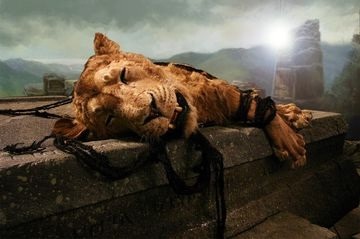
If in the first dream sequence we see that Buffy's Spirit (Willow) finds itself in complete disconnection with her Heart (Xander) and Body (Buffy), and in the second dream sequence we see that Buffy's Heart feels victimized ("whipping boy"), neglected ("raised by mongrels") and unfairly sacrificed ("set on a sacrificial stone"), then it's within the third dream sequence, Giles's (who represents Buffy's Mind), that we can successfully locate the ultimate acceptance of this self-sacrificial circumstance, and witness how that gets integrated into Buffy-The-Entity. If we go through Giles' entire dream under the presupposition that he's operating as Buffy's Mind, it follows, according to what we are precisely shown, that Buffy is still seeing herself as little more than a child who shouldn't be expected to undergo the same kind of sacrifice that Aslan (The Christ) faces, while simoultaneously being aware, on a purely rational standpoint, of it being a necessary component of the duty that it's her job to fulfill. The entire sequence is about the reconciliation, within Buffy's own Mind, of these two seemingly contradictory aspects. Almost absent-mindedly and with evident disregard, Giles recites the concept that Buffy needs to fully embrace ("The blood of the lamb and all that") suggesting reluctance at first, but he's put in front of the reality of things soon enough: after taking a final glance at a crying Olivia with a stroll turned upside down beside her (which substantially symbolizes Buffy's grief towards the loss of a condition of pre-acceptance and the loss of her own indulgence into the childish desire of having a normal life), Buffy's Mind ultimately focuses on Spike. The ultimate acceptance of the notion of sacrifice and of her role as Savior (Slayer) materializes in the exclamations of relief and bliss that the mass of photographers produce as soon as Spike, in a visibly liberating gesture, ends the shooting by posing in such a way as to recall the Biblical Crucifixion of Christ. This is, of course, all foreshadowing to The Gift (S5E22).
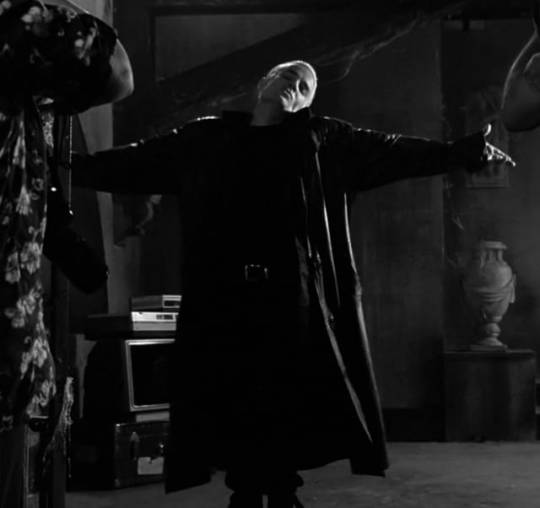
In Buffy's own dream, we witness a last initial attempt at resistance at this newly gained realization ("Buffy, you have to get up right away!" "I'm not really in charge of these things."), which quite rapidly turns into a spasmodic research of her friends. The Body alone isn't enough - it has to be reunited with the Spirit, Heart and Mind. Significant relevance, within this interpretation, lies in Buffy's dress during the dream - while still being fundamentally white (meaning absence of Sin, recalling her Prophecy Girl dress), this time it showcases a motif of cherries - fruit whose symbolic role is to represent the sacrifice of The Warrior, and which is also known as "The Fruit of Paradise". During the confrontation scene between the two Slayers, Sineya (The First) reminds Buffy that "The Slayer does not walk into this world" - what is being demanded of Buffy is that she recognizes her celestial (as in non-terrestrial, otherworldly) destiny and cuts herself off from the humanity she's expected to sacrifice for not only emotionally, but also physically. Buffy replies by underlining the importance of the Body ("I walk. I talk. I shop. I sneeze.") and thereby of the individual, while at the same time showcasing a definite acceptance at her own predestination provided by the cumulative integration of the previous dream sequences the other three elements constituting Buffy-The-Entity already experienced. The phrase "I'm gonna be a fireman when the floods roll back" is an explicit reference to The Bible and to two different apocalyptic scenarios. According to the Scriptures, the first "end of the world" kind of situation manifests itself through Water - Genesis' Flood, which God arranges in order to clean the Earth from corruption. By mentioning a return of the cataclysm, Buffy implicitly identifies herself with Noah's figure and role in building the Ark which granted him the ability to perform the salvific act of safeguarding humanity from total destruction. At the same time, though, she explicitly calls herself a "fireman", thereby also mentioning the second big "purification" - that of The Last Judgment, manifesting itself through Fire.
2 Peter 3:10 But the day of the Lord will come as a thief in the night; in the which the heavens shall pass away with a great noise, and the elements shall melt with fervent heat, the Earth also and the works that are therein shall be burned up.
With a single statement Buffy frames herself as The Savior of humanity in not one, but two apocalyptic circumstances. She is both the Ark that carries the remaining part of humanity to safety through the biblical floods, and the Fireman who is going to quench the fire during the final judgment.
The actual, definitive parallelism with Aslan's character (in itself an alternative, fictional personification of Christ), though, ultimately comes up when we take into consideration the events C.S. Lewis recounts in the final volume of The Chronicles Of Narnia, "The Last Battle" (1956). In that novel, Aslan himself brings about the Apocalypse. Dragons and giant lizards invade the Earth and destroy all vegetation with fire, the stars plummet down from the Sky and Aslan ultimately saves humanity allowing those "pure of heart" to enter the Real Narnia - which is an Eden-like Paradise whose appearance is indistinguishable from that of the Old Narnia (Earth), but that's also devoid of corruptibility and Original Sin. Those "impure of heart" perish in the imperfect copy of the actual world under the weight of the fire, leading Aslan to be accurately described through the very same expression Buffy uses here to identify herself: that of a Fireman - as in, someone who doesn't quench just the literal fire, thereby granting humanity safety and protection, but also the metaphorical representation of Sin itself.
Restless ends by letting us understand that within Buffy herself lies a dormant Aslan capable of doing that very same thing - of bringing forth a change so drastic and fundamental to not only save but also revolutionize humanity; of taking the entirety of Earth to a "higher level" wherein the Original Sin (that is, the very intrinstic nature of a broken, corruptible system) is finally eradicated; and of establishing a new kind of equilibrium in the co-existence of those pure and impure of heart. It's of particular importance, under this lens, to consider the fact that, as long as the Body (Buffy) is alone, she's vulnerable to the attack of that very system - the First Slayer has no problems striking effective blows against her in the middle of the desert, not so differently than how the Master was able to inflict an effective bite on her while she was alone in his lair. But as soon as the Body is reunited with the other parts and they get integrated within a singular, functional Entity, those same attacks cease to have any and all efficacy or effect - the Original Sin becomes insignificant, easily washed away by a baptism. In the desert, like in the sewers, Buffy is fragmented and exposed; within the walls of her home, or in the company of her friends, she's complete and invulnerable.
Because, as Aslan's character exists in this episode to precociously demonstrate, and as Buffy herself will come to finally understand and embrace in Chosen (S7E22), the key to truly save the world lies, ultimately, in changing it.
#buffy the vampire slayer#btvs#s4e22#restless#btvs meta#btvs analysis#christianity#religion#the chronicles of narnia#c.s. lewis#the lion the witch and the wardrobe#the last battle#aslan#btvs s4#narnia meta#buffy is aslan and is christ#buffy summers#xander harris#rupert giles#willow rosenberg#scooby gang#the core four#buffy meta#btvs spike#bible#original sin#the master#aslan the lion
20 notes
·
View notes